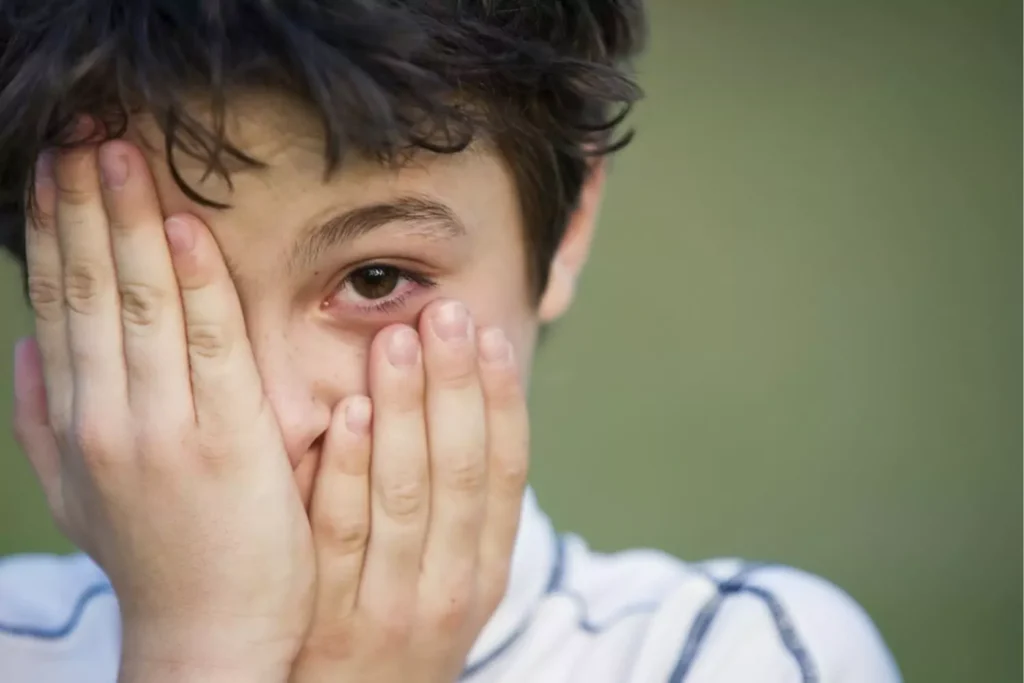
Talking to Your Son About Puberty
Few words carry more awkwardness and confusion than puberty. However, this is the most critical point in your son’s life. Take initiative in leading your son through these physical, emotional, and mental changes.

On the scale of uncomfortable things to talk about with your young kids; masturbation hovers around the top. But as awkward as it is, ignoring the topic won’t make it go away.
Sometimes it happens when kids are toddlers, sometimes when they’re preschoolers or middle schoolers. You’re bringing laundry to their room, or you pass their door and hear sounds that seem out of place. Or maybe you walk into your young son’s or daughter’s room and discover your kids masturbating.
What do you do? What should you do?
On the scale of “uncomfortable things to talk about with your young kids,” masturbation ranks toward the top. But as awkward as it is, ignoring it won’t make the situation go away.
The good news is that this type of behavior doesn’t indicate there’s something wrong with your child. Dr. Michael Sytsma, a licensed professional counselor and certified sex therapist (known as Dr. Mike) says that masturbation is actually “normative behavior” — God designed those parts of the body to feel good when touched. While this experimentation with the body may be part of growing up, parents can help their kids recognize healthy boundaries for this form of touch.
Young children often don’t have a proper sense of how to behave in public. They may pick their noses or touch their bottoms. At this age, kids seldom imagine anything sexual when they conduct self-pleasure. They are just enjoying a new physical sensation.
It’s best to start a conversation with them by explaining that just as picking their nose in public isn’t something we do, so is touching our private parts in public or private, except when cleaning them in a bath or shower, or at a check-up with a doctor.
But when the self-stimulating urge seems to become more frequent, Dr. Mike suggests that parents give more affection to children — ruffling their hair, holding or hugging them, along with a gentle spoken reminder.
Perhaps a “Sweetie, let’s find other things to make you feel better,” said quietly and privately.
The eBook The Talk is a very useful tool in teaching children of all ages about God’s wonderful gift of sexuality. It was written to minimize awkwardness and help parents begin clear, age-appropriate conversations with their children.
As kids enter school, they become more aware of culture and others’ behaviors. Beginning a conversation about masturbation tends to be easier. Especially when children are 4 to 8 years old because kids are more likely to talk openly.
For school-age kids, masturbation is sometimes used as self-soothing behavior. When kids feel lonely or rejected by classmates, doubt creeps in. When kids self-soothe in this age group, though, they will begin to hide their behavior from adults.
In this age and stage, knowing what to do when your kids masturbate depends on a variety of factors. However, Dr. Mike says that parents shouldn’t avoid bringing up the topic of masturbation. “If we avoid the topic, we’re allowing guilt and shame to build in a child, which is more destructive than many other things in a child’s life.”
Those early conversations don’t have to be descriptive, but they shouldn’t be so vague that kids don’t know what is being discussed. Talking about masturbation in a natural tone of voice and explaining simply how certain parts of the body feel good when touched can help parents pave the way for open and honest conversations later.
Then the conversation can move to the boundaries for this type of touch. Dr. Mike says, “Failure to discuss openly with your child results in confusion for your children as they have no context for what their feelings are about and what is and is not okay.”
Parents should work hard to avoid condemning messages, such as looking horrified and bursting into tears or yelling things like: “Don’t ever do that!” Punishing a child for masturbating is another form of shaming, as is telling him that masturbation is going to ruin his future sex life, prevent him from having children or grow hair on his palms.
While shaming may stop the behavior, says Dr. Mike, it doesn’t work well toward the higher goal of raising a healthy adult. Instead, consider asking the child whether he or she is feeling lonely or afraid. He says that at this age, “Self-soothing behavior is about something else.”
By the time your children reach the tween years, they are probably more aware of the existence of masturbation. “For a kid to get to age 9 or 10 and not have seen or heard something about masturbation is unlikely,” says Dr. Mike. Parents should continue to give their kids a context for what they see or hear at school or in the media.
He recommends having a serious talk at about age 11, whether it’s an official sit-down or a spontaneous conversation prompted by something seen on television or a comment by a kid at school.
Dr. Mike says, “Let’s talk about this topic and the framework in which God designed it: sexual pleasure being associated with a spouse. The goal isn’t to stop the behavior but to shape the person these children are becoming.”
If you don’t talk about God’s design for your child’s sexuality, your kids may not understand why you’re telling them to save sexual pleasure for marriage.
Without understanding God’s design, Dr. Mike explains, “Sexual behavior then becomes a rule, and kids break rules. But if kids know the value of God’s design and become stewards of that, they can become healthy adults.”
Dr. Mike suggests that dads talk to boys and moms talk to girls. If separate conversations are not possible because of a single-parent home or parents in the military or traveling, the topic should still be addressed. This isn’t a topic just for boys or just for girls.
Knowing what to do when your young kids masturbate can often leave you with more questions that answers.
However, what you say to your child depends on the strength of your relationship with him or her and your comfort level. Dr. Mike says, “If Mom and Dad are uncomfortable talking about the subject, the child may pick that up and interpret it with guilt or shame.” He suggests that parents practice talking about what to do when young kids masturbate with each other first.
Once the conversation is underway, be ready for long silences and embarrassed looks. All that is fine; parents need patience, honesty and a lot of courage to forge ahead. Even if you must continue the conversation later, assure your child that you’ll talk about it again and that you’ll answer any questions he or she has. After all, Dr. Mike concludes, “If we are silent, the only voice our children hear is culture’s voice.”
*If you believe your child’s behavior in this area is excessive or compulsive, or if its onset is coupled with circumstances or events that trigger more severe behavior, immediately consult with a trained counselor for help in ascertaining the nature of the matter. Our licensed counselors are available to listen and pray with you as well as provide guidance and resources. Find out more at FocusOnTheFamily.com/CounselingHelp or call 800-A-FAMILY (232-6459) Monday through Friday from 6 a.m. to 8 p.m. (Mountain time).